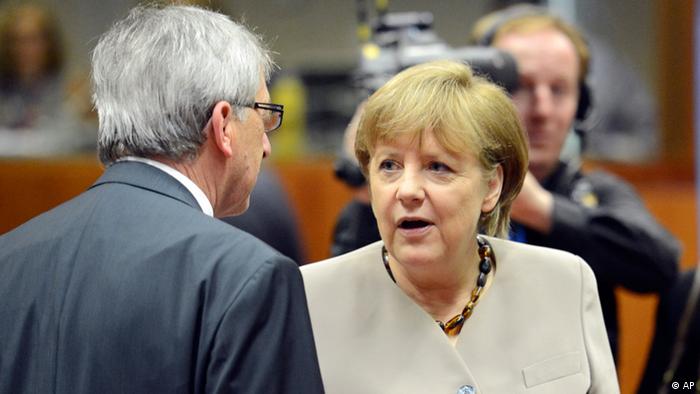EU leaders have agreed to spend 120 billion euros on immediate growth measures, but two countries have yet to sign off on the deal. Crucial talks are taking place at a summit in Brussels to tackle the financial crisis.
European leaders agreed to a new "growth pact" of measures worth 120 billion euros ($161 billion) to help revive floundering economies. Italy and Spain are holding out, however, as they refuse to sign off on any deal unless they receive help combatting their soaring borrowing costs.
"What we already agreed is ... to boost the financing of the economy by around 120 billion euros for immediate growth measures," European Council President Herman Van Rompuy said
With regard to Spain and Italy, Van Rompuy said talks were continuing.
"There are two countries that are very keen to ensure there is agreement on long-term measures and short-term measures," Van Rompuy said. "I wouldn't say there is a blockage, discussions are ongoing."
The leaders are in Brussels for a two-day European Union summit.
Seeking solutions fast
French President Francois Hollande attempted to set the tone when he arrived by urging leaders to make quick decisions to tackle the eurozone debt crisis.
"I have come to find very quick solutions to support the countries facing the biggest problems in the markets," Hollande told reporters, in a clear reference to Italy and Spain.
Action should be taken to "support countries that have undertaken reforms but cannot withstand interest rates that are too high," he said.
The EU's 27 heads of state have been facing increased market pressure to reach a common solution to the crisis, which has compelled Greece, Portugal, Ireland, Spain and Cyprus to ask for bailouts.
European Commissioner for Economic Affairs Olli Rehn said EU leaders may also take action to reduce borrowing costs for Italy and Spain, both of whom some have deemed too big to fail.
The possibility of forging a banking union is also on the agenda for the two-days of talks. Divisions remain between several leaders, however, over how to tackle the crisis.
Dealing with debt
Many have backed the idea of issuing mutual debt, possibly in the form of something known as eurobonds, as a means to lower indebted countries' borrowing costs. But German Chancellor Angela Merkel opposes the idea. She told the German parliament on Wednesday that eurobonds were "economically wrong and counterproductive."
She has insisted that countries should first surrender more powers to Brussels in an effort to integrate before any debt mutualization schemes are introduced.
ccp,tm/pfd (AFP, dpa, AP) dw de

Comments